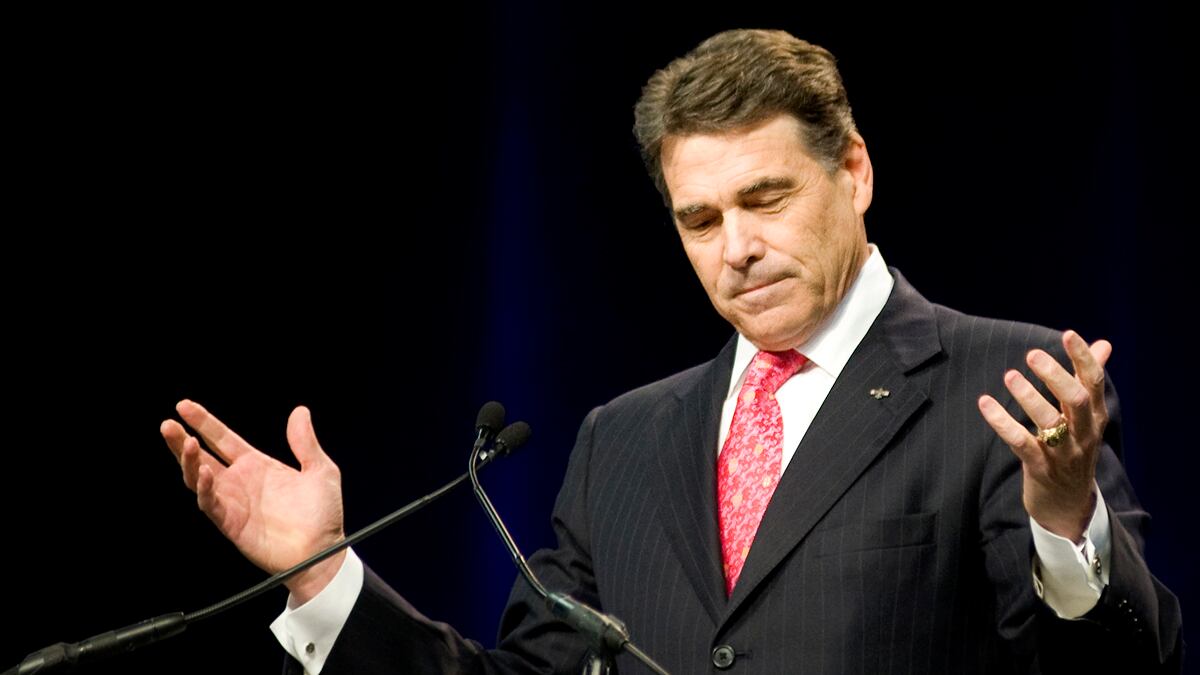Rick Perry could learn an important lesson from the startling result in the special election in New York: that campaigns based on religious solidarity and faith-based obligation are a risky proposition.
In a congressional district with 40 percent Jewish voters and the most concentrated Orthodox community in the country, Democrats turned to an observant Jewish candidate and the scion of a local political dynasty. State Assemblyman David Weprin’s father served in the assembly for 24 years and rose to the position of speaker, while his brother transitioned from the ancestral seat in the legislature to a position on the city council. Running against a conservative Roman Catholic, Weprin never expected problems with his fellow Orthodox Jews.
Nevertheless, on election day his “I’m one of you” appeals failed miserably. In Brooklyn’s heavily religious and Jewish Flatbush neighborhood, Weprin lost by a 2-to-1 margin to his non-Jewish rival, Bob Turner. An election eve poll showed more than 70 percent of voters who listed Israel as a top concern expressed a preference for Turner, despite Weprin’s longstanding support for the Jewish state and his eight trips to Jerusalem.
Of course Weprin suffered from association with President Obama, who is widely perceived as indifferent or downright hostile to Israel. And Weprin damaged his position in the religious Jewish community with his outspoken support for gay marriage. (His speech in the legislature emphasized his background as an Orthodox Jew while supporting a redefinition of matrimony that Orthodox rabbinic leadership unanimously rejects.)

Certainly, his co-religionists had plenty of reason to turn away from Weprin in last week’s special election to replace Anthony Weiner, but their doing so in such decisive numbers indicates that even for one of the more insular faith communities in the country, issues trump religious identity. A last-minute attempt to smear Turner as disrespectful toward authentic Judaism also failed: The Washington Times reported that thousands of voters received election day phone calls purporting to represent “Jews for Jesus for Turner,” perceived as an obvious Democratic stunt intended to portray Turner’s support within the Jewish community as the work of obnoxious apostates.
In a New York Times interview that appeared five days before the election, Weprin himself tried to push the idea that Judaism and liberalism are indissoluble. He told a story about the bar mitzvah of his older brother, Barry, at which his younger brother, who was 4 at the time, responded to the rabbi’s invocation of the biblical Abraham by singing a campaign jingle for Abraham Beame, who was running for mayor at the time. Weprin then recalled: “We didn’t talk about Abraham the patriarch at the dinner table—we talked about Abraham the Democrat.”
Times reporter Dan Bilefsky then compounded Weprin’s problems by concluding his profile with a description of the candidate at a debate smirking “with the mischievous grin of a 9-year-old weaned on politics and Abraham the Democrat.”
On the night this article was published, I appeared with former Defense Secretary Donald Rumsfeld at a New York panel for the Jewish Policy Center, where a number of Hasidic Jews from the ninth congressional district approached me to complain about Weprin’s view of our religious tradition. “Doesn’t he know that there are a lot of people who are sick and tired of hearing about ‘Abraham the Democrat’—or ‘Moses the Democrat,’ for that matter?” one said. “It’s going to lose him votes. It’s offensive to hear this stupid idea that being a good Democrat is the same thing as being a good Jew, or that Weprin is so proud of the fact that his family confused religion and politics.”
The results demonstrated that observant Jews in the ninth district made crisp distinctions between their faith commitments and their electoral decisions, and it’s unlikely that the Jewish community stands alone in its distaste for the political exploitation of religious identity.
At a time of near universal skepticism about overeager office-seekers, even some fervent evangelicals may look askance at any candidate who bids for their support primarily on the basis of shared faith rather than a shared policy agenda.
This poses special problems for Rick Perry who, more overtly and aggressively than any presidential contender since Pat Robertson in 1988, has cast himself as The Evangelical Candidate. In the last cycle, Mike Huckabee couldn’t fully escape that designation given his long history as a prominent Baptist pastor, but Perry has been a career Air Force officer and politician, never a member of the clergy. Nevertheless, his recent “confession of faith” at Jerry Falwell’s Liberty University demonstrates that he discusses the details of his spiritual life more eagerly, and more fluently, than even the unapologetically Christian George W. Bush.
Perry’s strategy seems to assume an ability to lock up the evangelical Christian vote before the campaign even takes shape, just as Weprin’s strategy saw him locking up the Orthodox Jewish vote. But there’s reason to believe that committed and conservative Christians may be no easier to corral behind a co-religionist candidate than were traditional-minded Jews in Brooklyn and Queens.
Most obviously, Perry still faces numerous challengers who also seek to make inroads among evangelical voters, including Michele Bachmann, Herman Cain, Ron Paul, and the Catholics Rick Santorum and Newt Gingrich. In the CBS News/New York Times poll of Sept. 15, Perry had won the support of only 28 percent of self-described evangelicals—just slightly better than his 23 percent showing among Republicans at large. In California’s Field Poll of Sept. 15, 28 percent of “born-again Christians” backed Perry while Mitt Romney, despite endlessly exaggerated accounts of anti-Mormon prejudice, kept the race competitive with 19 percent support among born-agains. At the same time, a Sept. 7 report in The Christian Post flatly declared that “unlike 2008, Romney’s campaign has more public support of some evangelicals, potentially drawing the influential GOP constituency to his side.”
In short, Perry runs a double risk when he deploys campaign themes that make him sound like a candidate for pastor in chief rather than commander in chief. Such messages could not only alienate Catholics, Mormons, moderate Protestants, Jews, and the religiously unaffiliated (still a significant segment of the Republican Party), but they also might raise the ire of many of his fellow evangelicals with too smug a blending of religious and political appeals.
If Perry blandly assumes that millions of evangelicals will back him simply because they believe as he does, he may ultimately discover that Jesus the Republican is no more suitable a running mate for a presidential candidate than Abraham the Democrat.






